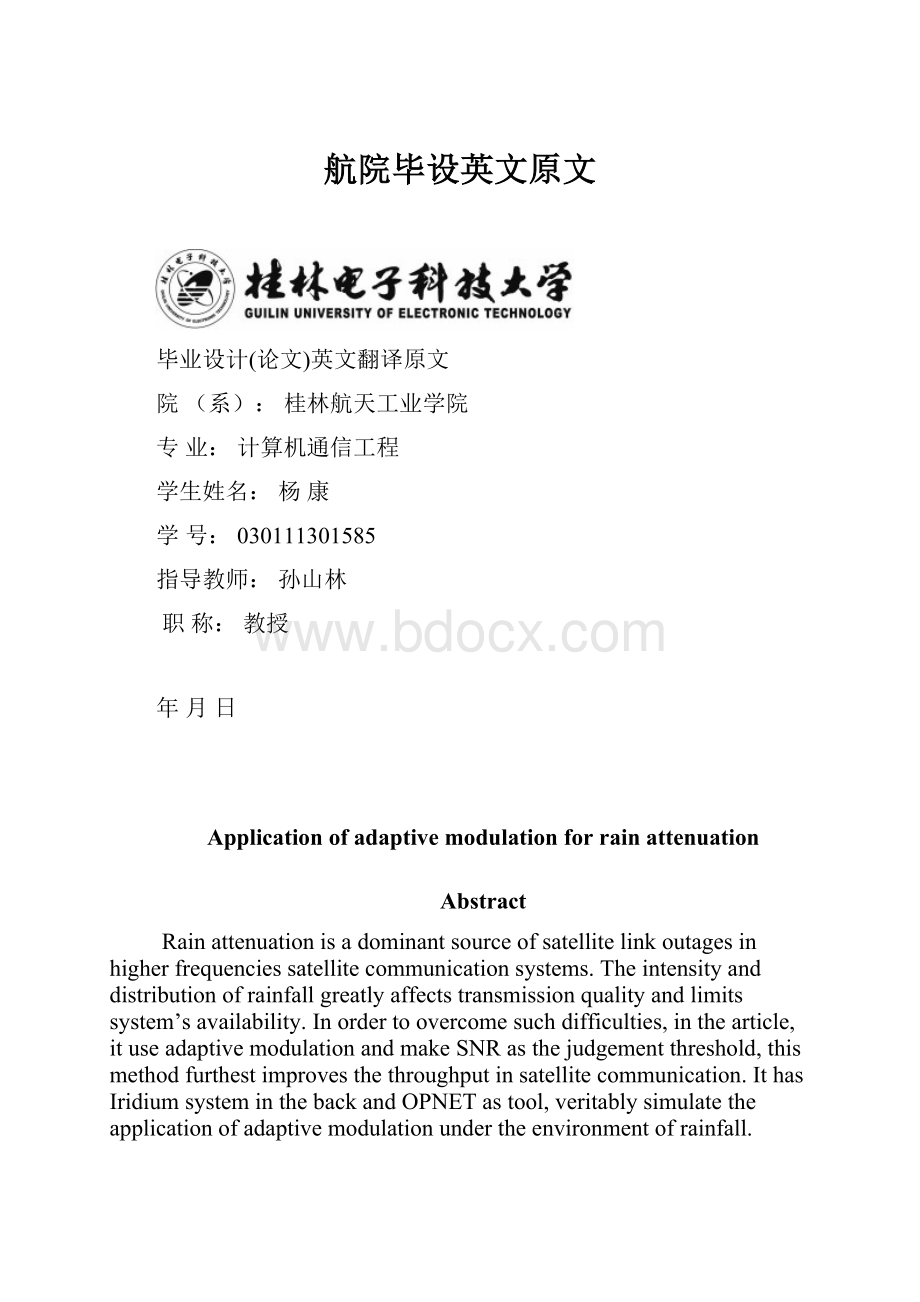航院毕设英文原文.docx
《航院毕设英文原文.docx》由会员分享,可在线阅读,更多相关《航院毕设英文原文.docx(18页珍藏版)》请在冰豆网上搜索。

航院毕设英文原文
毕业设计(论文)英文翻译原文
院(系):
桂林航天工业学院
专业:
计算机通信工程
学生姓名:
杨康
学号:
030111301585
指导教师:
孙山林
职称:
教授
年月日
Applicationofadaptivemodulationforrainattenuation
Abstract
Rainattenuationisadominantsourceofsatellitelinkoutagesinhigherfrequenciessatellitecommunicationsystems.Theintensityanddistributionofrainfallgreatlyaffectstransmissionqualityandlimitssystem’savailability.Inordertoovercomesuchdifficulties,inthearticle,ituseadaptivemodulationandmakeSNRasthejudgementthreshold,thismethodfurthestimprovesthethroughputinsatellitecommunication.IthasIridiumsysteminthebackandOPNETastool,veritablysimulatetheapplicationofadaptivemodulationundertheenvironmentofrainfall.Comprehensivetheoreticalanalysisanddedicatedsimulationsshowthatthesimulationresultsandthetheoreticalresultsarematchedperfectly.
Keywords:
adaptivemodulation;rainattenuation;OPNET;linkbudget;coverage
1INTRODUCTION
Satellitecommunicationlinksareaffectedbyrainfall,andsolaroutage,amongothers.Theseaffectsmustbetakenintoaccountsinsatellitelinkdesignandoperation.Thisarticledescribestheeffectsandtechniquestoquantifyandalleviatetheeffect.
Therapiddevelopmentincommunicationsystemshasforcedsystemdesignertoexplorehigherandhigherfrequencies.Rainisadominantsourceofattenuationathigherfrequencies.Theintensityanddistributionofrainfallgreatlyaffectstransmissionqualityandlimitssystem’savailability.Raineffectsonmicrowavesystemsaremorecriticalintropicalandequatorialzones,whererainfallishigherthanintemperatezones.Intemperateregionstheraineffectsbecomessignificantabove10GHz,whileintropicalclimatesingeneralandinequatorialclimateparticularly,sincetheraindropsarelargerthanintemperateclimates,theincidenceofrainfallonradiolinksbecomesimportantforfrequenciesaslowasabout.
Inordertoovercomesuchdifficulties,inthearticle,ituseadaptivemodulationandmakeSNRasthejudgementthreshold,thismethodcanfurthestimprovethethroughputinsatellitecommunication.IthasIridiumsysteminthebackandOPNETastool,veritablysimulatetheapplicationofadaptivemodulationundertheenvironmentofrainfall.
2THEORETICALANALYSISOFADAPTIVEMODULATION
2.1Basictheoryofadaptivemodulation
Inthetraditionalmodulationmode,inordertoensuretheBERperformanceofthesystem,italwaysselectstheappropriatemodulationonthebasisoftheworstsituationofchannel.Thismethodcanensurethereliabilityofchannelduringthecommunication.Astheworsttimeofthetransmissionisveryshort,soitwillcausehugewaste.Inordertofurthestimprovethethroughputoftheinformationtransmission,inthisarticle,wewilluseadaptivemodulation.Thebasictheoryofadaptivemodulationischangethemodulationmodeinlinewiththesituationofthechannel.Inthesystemofadaptivemodulation,theusersalwayschoosethehighermodulationmodeinidealchannel,andchoosethelowermodulationmodeinnotidealchannel,thismethodnotonlycanensurethereliabilityofchannelduringthecommunication,butalsocanurthestimprovethethroughput.
Inthearticleweusethefixedthresholdmethodasthemodulationmodeinthesystemofadaptivemodulation.ItfirstsetsareliableBERthresholdbasedonthetrafficcharacteristicsinthefixedthresholdmethod,andcalculatetheSNRvaluefortheappointedBER,thencompareeverythresholdvalueandchoosethecorrespondingmodulationmode.
2.2Calculationofjudgementthreshold
Thedesignofadaptivemodulationiscloselyrelatedtothecalculationofjudgementthreshold.Inthearticleweusethecriterionofthresholdasfollowing:
maintainacertainBERandthethroughputisvariable.Theselectionofmodulationmodeexertsanessentialeffectonthesystemofsatellitecommunication.Inthearticle,weuseBPSK_1/2FEC,BPSK.,8PSK,64PSK_2/5FEC,64PSKfivemodulationmodes.Usually,SNRisdirectlyrelatedtochannelstate,inordertoanalyzeeasily,itusetheapproximateexpressionbetweenSNRandchannel,thecalculationofBREforM-aryisgiven:
(1)
Fig1ThecurveofBERandSNRundertheconditionof
adaptivemodulation
Thetransmissionefficiencyofthemodulationmodeaboveisgiven:
(2)
BPSK_1/2FEC(M=2)
BPSK(M=2)
8PSK(M=8)
64PSK_2/5FEC(M=64)
64PSK(M=64)
UnderconditionthatBERisintherangeof10-6to10-5,italwayschoosesheadaptivemodulationmodeofhigheffciency.
Accordingtotheformulaabove,wecandeducetheSNRthresholdvalueofadaptivemodulation:
whenSNRislessthan9dB,itonlycanchooseBPSK_1/2FECmodulationmode,asthereis50%redundancy,sothethroughputwillreducebyahalf;WhenSNRisbetween9dBand13dB,themodulationofbothBPSK_1/2FECandBPSKsatisfytheneedofBER,butthereisnoreductioninBPSKmodulation,sothethroughputishigher;WhenSNRisbetween13dBand23dB,asSNRishigher,soitcanchoosethebettermodulationmode,thethroughputof8PSK,64PSK_2/5FECand64PSKishigh,butonly8PSKsatisfiestheneedofBER,soitchooses8PSK,andthethroughputisthreetimeshigherthantheoriginal;WhenSNRisbetween23dBand28dB,thethroughputofboth8PSKand64PSK_2/5FECsatisfytheneed,inordertogetthehigherthroughput,itchooses64PSK_2/5FEC,andthereis40%redundancy;WhenSNRismorethan28dB,allkindsofmodulationmodesatisfytheneed,butthethroughputof64PSKisthehighest,sowechoose64PSK.
Accordingtotheanalysisabove,wecandeducetheselectionschemeofadaptivemodulationmodeasfollowing:
Table1Schemeofadaptivemodulation
RangeofSNR(dB)
Modulationmode
SNR<9dB
BPSK-1/2FEC
9dBBPSK
13dB8PSK
23dB64PSK-2/5FEC
SNR>28dB
64PSK
3.RAINATTENUATIONMODELING
3.1.Rainareadistribution
AccordingtotheITUstandard,thewholeworldcanbedividedintoA,B,C…Qfifteenrainareas,thefiguresinthefollowingaretherainareadistributionmapsofEurope,Asia,andAmerica.Therelationshipbetweenrainfallintensityandtimeisshownintable2
Fig2RainareadistributionmapsofEurope,Asia,andAmerica
Table2TherelationshipbetweenrainfallintensityandtimeaccordingtoITU
(1)For,theslantpathlengthis
(3)
Forthefollowingformulaisused
(4)
(2)CalculatethehorizontalprojectionLG
(5)
(3)Obtainthespecificattenuation
(6)
(4)Calculatethehorizontalreductionfactor,for0.01%ofthetime.
(7)
(5)Calculatetheverticaladjustmentfactor,forthe0.01%ofthetime
For
else
If
elsex=0
(8)
(6)Theeffectivepathlengthis
(9)
(7)Thepredicatedattenuationexceededfor0.01%ofanaverageyearis
(10)
Therainwillnotonlycauseattenuationofsignalpower,butalsowillcauseincreaseinnoisepower.
Intheclearsky,thetemperatureis
(11)
Aclearisattenuationintheclearsky.,Intherainsky,thetemperatureis
(12)
Theraiseinthetemperaturecausedbytherainis
(13)
WheretheTLANisthetemperatureoftheLAN.
3.2.Coverage
Fig3ThecoverageareaoftheLEOsatellite
Thepathlossisgivenby
(14)
WheredisthedistancebetweentheearthstationandIridiumsatellite,andmaximumandminimumvisibilitydistancesdmax,anddminisgivenby
(15)
Combiningthelasttwoequationsyieldsvisibilitydistancedcriterion,wehave
(16)
Wherermaxismaximumvisibilityradiusand
isthemaximumearthcentralangle.
Fig4ThedistancebetweentheearthstationandIridiumsatellite
ThecurvesinFigure4varybetween780kmand2500kminapproximately2hourperiod.Itimpliesthatasatellitecanbevisibleagainfromthesameplaneinabout2hours.Ineachperiod,thereareseveralpeaksandvalleyswhosevaluesaredifferent,correspondingtothedifferentsatellites’coverage.Eachhandoffhappensatdifferentearth-satellitedistancesandthecoveragelastsabout10minutes.Itisbecausethattheorbitplaneisshiftingallthetime,thecoverageofeachsatelliteisnotsimplyrepeatingbutslightdifferent.
4.OPNETSIMULATION
4.1Networklayermodeling
Fig5IridiumNetworkmodel
Inthesimulation,thenetworkismadeupofsixty-sixIridiumsatellites,twoearthstationsandothermobileterminations,theorbitofIridiumsatellitesiscreatedbySTKandthenetworktopologystructureis.star.Intheprocessofsimulation,IridiumsatellitenodesflyaroundtheearthalongtheorbitofIridium,andthetwoearthstationscommunicatewitheachotherthroughsixty-sixIridiumsatellites.AsthecoverageofIridiumislimited,sotheearthstationswillcommunicatewitheachotherthroughseveralsatellites.
4.2.Nodemodeling
Nodeisoftenconsideredasequipmentorresource,ismadeupofhardwareandsoftwarewhichcanprovidecorrespondinghandlingcapacity.InOPNET,thereisthreekindsofnode:
thefirstisfixednode,suchasrouter,switch,workstation,serverandsoon.;thesecondismobilenode,suchasmobileStation,vehicleandsoon;andthethirdissatellitenodewhichrepresentssatellite.Theattributeofeverynodeis
differentfromeachother,forexample,mobilenodecanusethree-dimensionalortwo-dimentionalmobileorbit,andthesatellitecanusesatelliteorbit.
Fig6EarthstationandIridiumsubnetnodemodel
Forthewirelesschannel,themessagetransmittingprocedurebetweencanbedescribedbyaseriesofstages.ThefourteenstagesintheOPNETcanvividlysimulatetheprocessofsendingandreceivingmessage.
5.CONCLUSIONSSIMULATIONSANDANALYSIS
Th